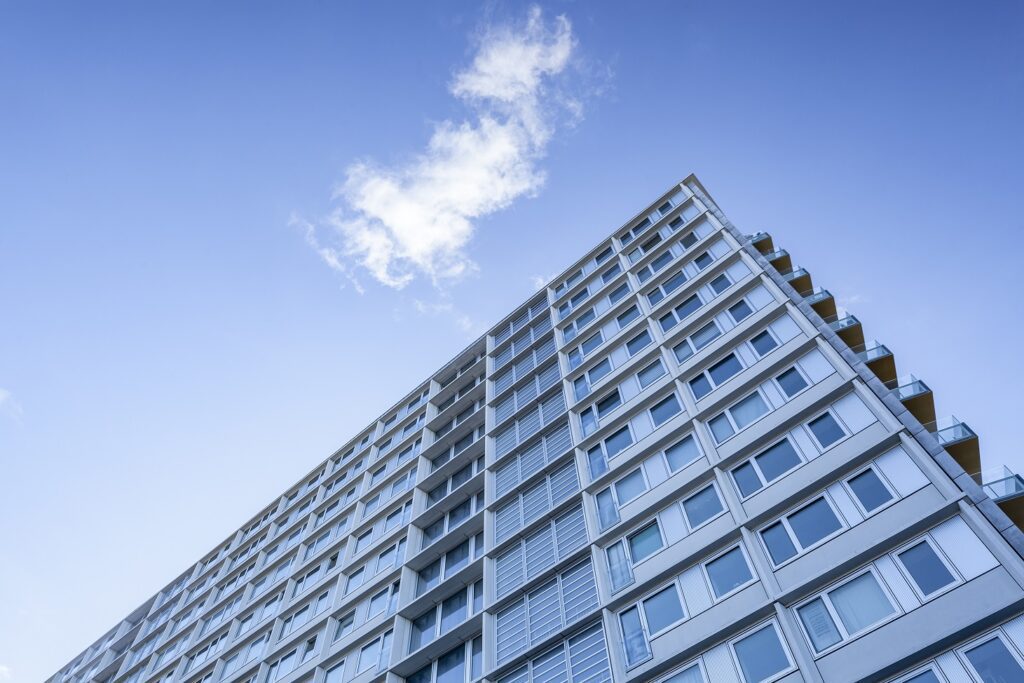Friday’s blog video was about the pre-construction condo marketand how I am of the opinion that there is no longer any money to be made.
One reader commented, “People keep buying because the market keeps going up!”
He’s completely missing my point…

Rewind to the spring of 2002 and I was an eager student business student at McMaster University.
We had just come out of the tech bubble and almost every kid I knew from the “Trading Centre” had lost all his money by swing-trading shares of Sun Microsystems et al, so when I stepped foot into my “Securities Analysis” course, I planned on ditching everything I knew about stock market analysis and “emptying my cup,” as Bruce Lee would say.
The course was nothing like I expected.
There was no real-world application, and it was nothing but math.
I was more of a technical analyst than a fundamentalist (Fundamentalists – now is when we argue. You think I’m lazy and unintelligent, and I think you’re wasting time looking for the “why” when all you need is the “what”), and I was hoping to actually analyze stocks instead of just theorizing with x, y’s, and z’s.
I think I squeaked out a B- in the course, but I didn’t enjoy any of it. I learned very little, but what I did learn was perhaps one of the most salient points I took home from four years of business school.
On the very first day of class, our professor asked us one simple question:
“Can you beat the market?”
I’ve probably told this story over and over during the last four years on my blog (I’m losing track after 756 posts…), but it’s worth repeating again.
Can you beat the market?
If you can, then bravo. You’re in the minority.
If you made 27% on your stock portfolio last year, it means nothing if the TSX rose 29%. In essence, you lost.
Oh sure – you made 27% more than the people that sat on the sidelines, but by actively trading your own portfolio, or by paying a financial planner to pick investments for you, the result was a loss of 2% from what the market bore.
You did not beat the market.
If the TSX composite and/or the Dow goes up 32.7% next year, and your stock broker makes you 22%, then he is a monumental waste of time and money. You could have put your money in the index and you would have done better.
Can you beat the market?
My professor challenged us to beat the market, and of course, none of us did. The TSX (back then it was the TSE) improved a little more than 2% during the four months that I took that course, and I believe my fantasy portfolio lost about 5-6%.
I did not beat the market.
In any market and with any investment, it’s all about beating the market.
“Consistent returns” is a term that is thrown around a lot, but it’s meaningless without context.
If you “consistently” return 7.5% per year, every year, for ten years, what does that matter if the overall market returned an average of 12% and may or may hot have included massive fluctuations during the same time period?
Real estate is no different, in my opinion, and the comment that was posted on my blog last Friday was the inspiration for this post. That comment read:
“The reason ppl keep buying is because the market keeps going up. Have you ever seen the market go down in the last fifteen years? Nope! So ppl keep buying preconstruction because the market keeps increasing. Shouldn’t you know this?”
I didn’t respond on Friday because I thought this one comment needed an entire post to address.
This person is arguing that people purchase pre-construction condos because the market always goes up.
Let’s assume for a moment that this is true. Let’s assume that the Toronto market will go up every year forever and analyze this comment.
Let’s assume that this reader, Mr. Reader, bought a condo today at “Pizzazz” for $385,000. The condo is 700 square feet, and thus $550 per square foot.
If you fast-forward to 2014 when this condo is completed, the condo is worth $437,500, or $625 per square foot.
Mr. Reader, in his infinite wisdom, has made money. He has made a 14% profit as the market has gone up.
He was right – “people keep buying because the market keeps going up.”
However, I fear that he missed my point entirely.
Rather than buying pre-construction, he could have purchased existing resale at the same point in 2011, and he still would have made that 14% profit that we see above.
He did not beat the market.
THIS is the point I’m trying to make.
We can get off onto a sidebar about how pre-construction condos can/will/might/won’t appreciate more/less over the next three years than that of resale, but we’re talking a couple percentage points in difference.
The major point here is that “the market” goes up 14%, and Mr. Reader had his money in pre-construction and made 14%. He did not beat the market, he simply put his money in the equivalent of an index fund, and he took whatever the market gave him.
So how did pre-construction used to work?
Well as I said in my video last Friday, and as I’ve been saying for the past two years – there used to be an inherent discount in the price of pre-construction.
Just as you pay less for cake mix than you do for cake, you used to pay less for pre-construction than you did for resale.
Let’s assume that things worked today in 2011 the same way they did back in 2006, and let’s assume that Mr. Reader looked at existing resale condos, which were trading at $550 per square foot, and decided to put down a deposit on a pre-construction condo next door for about $375 per square foot.
The condo cost him $262,500, which seems ridiculously low, but he realizes that he’s not buying a condo – he’s buying a piece of paper that says one day he will trade it in for a condo. He’s buying the risk that this condo will never be built. He’s buying the ten months of occupancy he has to endure before the condo is registered and he can sell it. He’s buying the constant construction zone he’ll live in. He’s buying the unfinished amenities, the broken promises, the material defects, and the disappointment from developers in Ontario.
Shouldn’t he receive a discount for all of this?
That’s how things used to work.
Fast forward to 2014, and the condo is worth $437,500. He’s made a profit of 67% – a whopping amount of money when you consider that the market only increased by 14% in the same time period.
He has beaten the market.
So why did he make so much money?
Because pre-construction properties were being sold for a discounted price relative to comparable resale available at the same time.
The discount was the entire reason for buying pre-construction.
It was, in essence, a built-in profit.
You, the buyer, the “risk taker,” were being compensated for waiting three to four years to take possession of this condo, rather than getting it in thirty days like with resale. You were also taking on the headaches mentioned above, and thus you were offered the unit at a price substantially lower than what was readily available on the market.
Doesn’t that make sense?
Today, pre-construction prices are equal to that of comparable resale. This means that you are tying yourself to the market, and your pre-construction condo will be worth whatever the market has to offer in 3-4 years. There is no reward; no compensation.
So let’s address the one issue we’ve never talked about before; the elephant in the room, if you will.
The market has done nothing but go up for the last fifteen years, but what if it went down?
What if you bought a pre-construction condo for $500,000 and the market started to drop?
Well, if you had bought a resale condo, you could sell it for $490,000, or $475,000, or whatever the market has to offer when you finally decide to dump it.
But if you have tied yourself to pre-construction, you’re stuck with this for the long haul. When the condo is finished in 2014, and it’s worth $420,000, you close the deal and own something that is worth less than what you contracted to pay for it.
You can’t sell what you don’t own, let alone what hasn’t been built!
Take the case of Floridian luxury condos that plummeted in value. Investors contracted to pay $5,000,000 for condos and put down $500,000. Four years later, those condos had plummeted in value and were worth $3,000,000. Rather than close the deals and take the $2,000,000 losses, those investors walked away from the deal and said “goodbye” to their $500,000 down payments.
We’ve only ever seen an up-market! If the market were to decrease during the time period that you’re pre-construction condo is being built, you’re going to lose. Pre-construction condos are illiquid since you don’t own them until 8-12 months after you’re given occupancy, and because, well, they haven’t even been built!
At least existing resale properties are liquid enough that you can sell them at any time!
As a final thought, there was a discussion about Friday’s blog video on one of my favourite real estate forums, www.buzzbuzzhome.com. The comments posted about my video were very astute, as one reader essentially said that pre-construction condos will out-appreciate the resale condos during the same time period, which is why people keep buying them.
He raises a good point.
As I alluded to above, we can’t paint the entire market with the same brush, and it’s entirely possible that pre-construction condos will increase 17% in the same period that the market increases 14%.
But in my opinion, the entire reason we used to buy pre-construction condos and take on the risk (that the project will fall through, that the market will drop, that there will be material changes, etc) and endure the lengthy 8-12 month occupancy period when we all bleed money is because of the “built-in profits.” When we were paying $375/sqft for something that would have sold for $450/sqft if it was ready today, we were being rewarded for our our risk.
Now, we’re looking at “out appreciating the market” as our risk, and it’s not enough, in my opinion.
I have stopped selling pre-construction condominiums altogether because I don’t sell what I don’t believe in.
Call me an idealist if you will, but I think there are far too many Realtors in this business, and far too many with less than one year of experience who will sell anything, anytime, anywhere.
As long as that continues, we’ll see pre-construction condos continue to rise.
After all, where else other than a pre-construction launch party can you get such amazing crab cakes and chicken skewers?































Joe Q.
at 8:06 am
“Call me an idealist if you will, but I think there are far too many Realtors in this business, and far too many with less than one year of experience who will sell anything, anytime, anywhere.”
This might be an interesting topic for a post, David. I have read that in Ontario about half of registered realtors only do a few transactions per year.
David Fleming
at 10:57 am
@ Joe
You’re right – I could do an entire post on this subject. But would I get in hot water with RECO?
In REBBA 2002, Section 39 reads, “A registrant shall not, in the course of trading in real estate, engage in any act or omission that, having regard to all of the circumstances, would reasonably be regarded as disgraceful, dishonourable, unprofessional, or unbecoming a registrant.”
REBBA is full of grey-area, blanket-statements like this one that could apply to, say, a Realtor-Blogger standing up and saying, “There are 32,000 Realtors in the GTA and we could probably do with about 10,000. And 25% of Realtors do less than one deal per quarter, while 25% of Realtors have less than two years in the business.”
I’ll check with my manager about what I can write, but there’s no doubting the fact that the legion of 24-year-old, club-going, Starbucks-drinking, “what do I do with my life” Realtors with six months of experience under their belts will take issue with my opinion…
Marina
at 8:33 am
I completely agree with you, but I think our real estate market has the same problem that the US real estate market had – most people lack the basic financial education to understand why / how investments work.
The reality is, most non-professional investors who buy pre-construction are young, buying their first home, and not really understanding what they are doing. They want to buy a “sick” condo now, and expect to magically get more money later.
They don’t look at resale, because using a pre-owned bathroom is gross.
Plus the newer stuff looks way cooler when your friends come over after clubbing to throw up on your sofa.
And you get to pick up chicks by saying you are a real estate tycoon or some other bullsh*t.
Compare that to buying a smaller semi in mid-town or a finished condo in one of the more established buildings downtown. Obviously, financially it’s a much better call. But it just doesn’t sound as cool.
Until we get financial education in schools (and I mean REAL financial education, not some lip service about “paying yourself first”) the lemmings will keep jumping off the cliff.
Sam
at 8:39 am
Great write up on Pre-Construction condos but I must ask, you say that Pre-Construction condos are “illiquid” but what about assignment sales? Is there not a market for condo assignments in Toronto?
Mila
at 9:44 am
Exactly!
Pre-construction condos must provide greater return than resale PLUS the “compensation” to be worth the while.
But how do you measure compensation on changes that a builder can do on a whim and you can’t do anything about it? Its worse than gambling. And that is the hidden risk that’s never mentioned and never compensated.
Assuming your condo is built after years and seemingly builder has “delivered” a condo. Then you step into your new condo for the first time and see 2 giant so-called “structural columns” that take up half of your sqare footage that wasn’t on the original plan. Ofcourse you can’t do anything about it, because essentially the builder can do whatever they want. You now have 2 giant columns in your condo, and your condo is that much smaller and less attractive/practical. What about compensation for that? Had you bought it resale – this would have been a factor.
MattO
at 10:10 am
I think a big reason why people continue to buy pre-construction condos is for speculative/’investment’ purposes. A point you haven’t addressed yet (and I believe others have brought up previously), is the mortgage payments that you’d have to make on the existing resale condo over the same period of time that the pre-construction condo was being built.
Let’s assume that you’re one of these speculative real estate investors looking to get into the condo market this year. You can either buy a 300k resale condo now with 20% down upfront, or a 300k pre-construction condo with 20% down as well. However, the down payment on pre-construction condos is usually spread out over the period of a year or more, correct? So the pre-construction condo already comes out ahead in this case, as you don’t have to have that 20% (60k) tied up right away, and are free to invest it elsewhere and gain on it (assuming you invest it wisely). Let’s say the pre-construction condo is due to be complete in 3 years, after which it will sell on the market for the same price (just for argument’s sake) as the resale condo, let’s just say 350k. Then, over those 3 years with the resale condo, you would have had to find somebody to rent the place, to cover the cost of your mortgage payments and maintenance fees, whereas with the pre-construction condo, it wouldn’t have been necessary as there were no mortgage payments required over those 3 years. Now, finding a renter and being a landlord can cause arguably even more headaches than dealing with all the pre-construction condo issues; and that’s why I believe people still buy pre-construction condos now.
Ralph Cramdown
at 10:31 am
Aren’t the real elephants in the room leverage and carrying costs?
Presumably, an investor thinks the market will continue to go up. His return depends on his leverage, carrying costs and rental income over his investment time frame, and those numbers are very different for pre-construction and resale. Sure, assuming he pays cash at the time of signing makes the math easier, but it’s totally unrealistic.
Words for the day: Contango and backwardation.
JG
at 3:45 pm
Just in regards to this statement:
“while 25% of Realtors have less than two years in the business.”
Lest we forget we were all once new to our professions.
And for every “24-year-old, club-going, Starbucks-drinking” out there, there is equally the committed amd deligent one trying his best to stake out a name and legacy for himself in that Industry.
Personally, I see it in the mortgage broker industry all the time. Turn over is very significant.
We cannot paint the broad brush on everyone. Every sector has their own attrition process – but generally, once they stop making an income, they leave.
A little digression from topic of post – sorry.
jk12
at 4:04 pm
I totally agree with @Joe and @DavidFleming. @DavidFleming could get into a little bit of hot water talking about this. But as someone who is currently getting his real estate license, I can’t agree more that for the most part the vast majority of Realtors working in Toronto are completely IDIOTS.
The vast majority of Realtors in Toronto do less then 4 deals a year…. in TORONTO!!!!!! what are these people doing…. pounding seven gram rocks like charlie sheen…. my 12 year old cousin could work in real estate full time and sell more then 4 condos a year!!!!!!!
I say forget about those 20-something real estate yuppies and write a post on it David.
10,000……. how about 6,000-8,000 Realtors, and increase the requirements to get a license. getting a real estate license is something that a lot of people get to do “on the side”. These people shouldn’t be allowed to represent anyone. Do you really want some retail working green horn representing you when you are spending $300,000+? I don’t
WEB
at 6:32 pm
If you want to learn an investment philosophy that will beat the market if applied correctly, read the following:
http://www.berkshirehathaway.com/letters/letters.html
If you read and understand these letters, you will be more intelligent and have a better investment record than 99.9% of the so called investment professionals who work on Bay St.
David Fleming
at 9:09 pm
@ WEB
The one glaring deviation here is 1999.
The market gained 21% and Buffet lost money!
This was during the tech bubble, and I know Buffet didn’t believe in day trading companies that had no revenue streams but DID have a ‘.com’ in their company name.
Thanks for providing this!
LC
at 7:02 am
I gave up on pre-con/Toronto a long time ago, and I even work for a builder. The people buying our units are predominantly investors overseas.
I decided instead to take my chances in Florida, on a rental condo in a complex with a healthy reserve fund, in a beautiful and safe location. I bought the unit for 55% below it’s peak 2006 value, and even though the market is at it’s worse, it’s still earning me a NET return of 7%.
Joe Q.
at 9:51 am
For @WEB, @DavidFleming and @JG — my main issue with the “less than four transactions per year” is that the field seems to be crowded with part-timers who are just in it for easy cash. It indicates that the barrier to entry (licensing) is too low.
Joe Q.
at 9:54 am
My main issue with the “less than four transactions per year” is that the field seems to be crowded with part-timers who are just in it for extra money and don’t really have much “skin in the game”. For example, where I work there is a manufacturing technician who has a RE license and does deals on the side. The barrier to entry right now is too low.